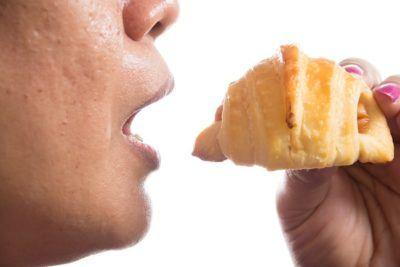
If you’re like most people, you’d probably say you could lose some more weight. Maybe back in January one of your resolutions was to lose weight. Since then you’ve gotten too busy and unmotivated.
Besides regaining that ideal body that looks great in a swimsuit, more self-confidence and better health, what if you also knew that a healthy diet also contributes to good dental health?
You’ve likely heard that sugar causes cavities, and you’re right. But, all food has some sugar in it.
Why are some foods bad while others are good?
The good foods have much needed vitamins and minerals as well as sugar. Bad foods are merely just sugar, having no nutritional content.
A poor diet that consists of sugars, starches and carbohydrates contributes to a mouth that is more prone to gum disease, tooth loss, tooth decay and cavities.
A nutrient-depleted diet increases the production of plaque that produces an acid that destroys tooth enamel. Cavities are formed when the tooth enamel is broken down (a process called demineralization).
Your body naturally absorbs minerals from the food you eat to build up and strengthen teeth. This is called remineralization and it is aided through saliva and fluoride.
Cavities are formed when the rate of demineralization is faster than the rate at which minerals are being absorbed (remineralization).
Most foods are broken down later in the digestive system.
Fermented carbohydrates, such as those found in bread, crackers, cookies, cakes, and cereal, generally get broken into the simple sugars of glucose, fructose, maltose and lactose. These sugars in turn, aid and speed up the process of the plaque’s enamel destroying activity.
You can still eat all the right things and still be at risk of cavities.
This has to do with your eating habits.
Sipping sweetened coffee or soft drinks throughout the day and consuming small, starchy snacks and desserts by themselves can constant bacteria and acid on your teeth. This is the result of not eating and drinking unhealthy items alongside a meal. At meal time, your saliva production is elevated, whereby better cleaning the plaque and bacteria from the unhealthy things that are consumed. On top of that, plaque and bacteria from food don’t only produces acid when consumed, but can produce enamel eating acid up to 30 minutes after consumption.
What to Eat
All food has the potential to leave enamel-eating plaque. Some foods, however, have essential vitamins and minerals that support and build-up your teeth and gums.
According the USDA, a well-balanced diet contains the following:
- Eat whole grains daily instead of refined grains. Whole grains include brown rice, oatmeal and whole wheat bread.
- Eat healthier vegetables, including dark green and orange vegetables.
- Eat a variety of fruits.
- Fish, beans, nuts and seeds for protein.
- Drink and eat sugary drinks and foods in moderation.
- Choose and prepare foods with less salt.
- Drink alcoholic beverages in moderation.
Besides diet alone, achieve a healthy weight by also adding daily exercise to your diet.
- More specifically, a healthy diet will consist of:
- Half a plate of fruit and vegetables
- At least of your grain intake needs to be whole grains.
- A variety of proteins, including lean meats, beans, eggs and nuts
- A daily intake of low-fat or no-fat milk, yogurt and cheese
- Fluorinated water and tea
- Only have sweets on special occasions
In addition to the ideal diet outlined above, implement these additional steps in protecting your teeth:
- Limit between-meal snacking. Fewer snacks mean less acid exposure for your teeth. If you snack, choose foods that are not fermentable carbohydrates.
- Limit the amount of soft drinks or any other drinks that contain sugar. Limit the amount of time you take to drink any of these drinks. Avoid sipping them throughout the day. A can of soda that you finish with a meal exposes your teeth to acids for a shorter time than a soda that takes you two hours to drink.
- Avoid sucking on hard candies or mints. They have enough sugar to increase the acid produced by bacteria to decay levels. If you need a mint, use the sugarless varieties.
- Limit very acidic foods because they can make the mouth more acidic. This may contribute to a loss of minerals in the teeth. The effects of acid exposure add up over time.
- Brush your teeth after eating and after drinking sugary drinks, to remove the plaque bacteria that create the destructive acids. If you cannot brush after every meal, brush at least twice a day.
- Chew sugarless gum that contains xylitol. This can help reduce the risk of cavities. The gum helps dislodge some of the food stuck to your teeth. It also increases saliva flow to help neutralize the acids.
What you eat and drink and how you eat and drink them affects your dental health. Unhealthy, sugary foods and drinks don’t provide any nutritional benefit to your teeth and gums. They do produce enamel-destroying acids. A healthy diet composing of foods that contain vitamins, minerals and nutrients help stem tooth decay by supporting and building-up gum tissue and tooth enamel.
Eating snacks and drinking sugary beverages throughout the day exposes your teeth to more bacteria, plaque and acid that eat away at tooth enamel.
Besides a healthy diet and eating schedule, proper dental hygiene is also important in preserving your teeth. At-home oral hygiene and regular professional teeth cleanings and exams are vital in proper dental hygiene.
Contact us today at Stonecrest Family Dentistry to schedule your teeth cleaning appointment and let us help you protect your beautiful smile.
